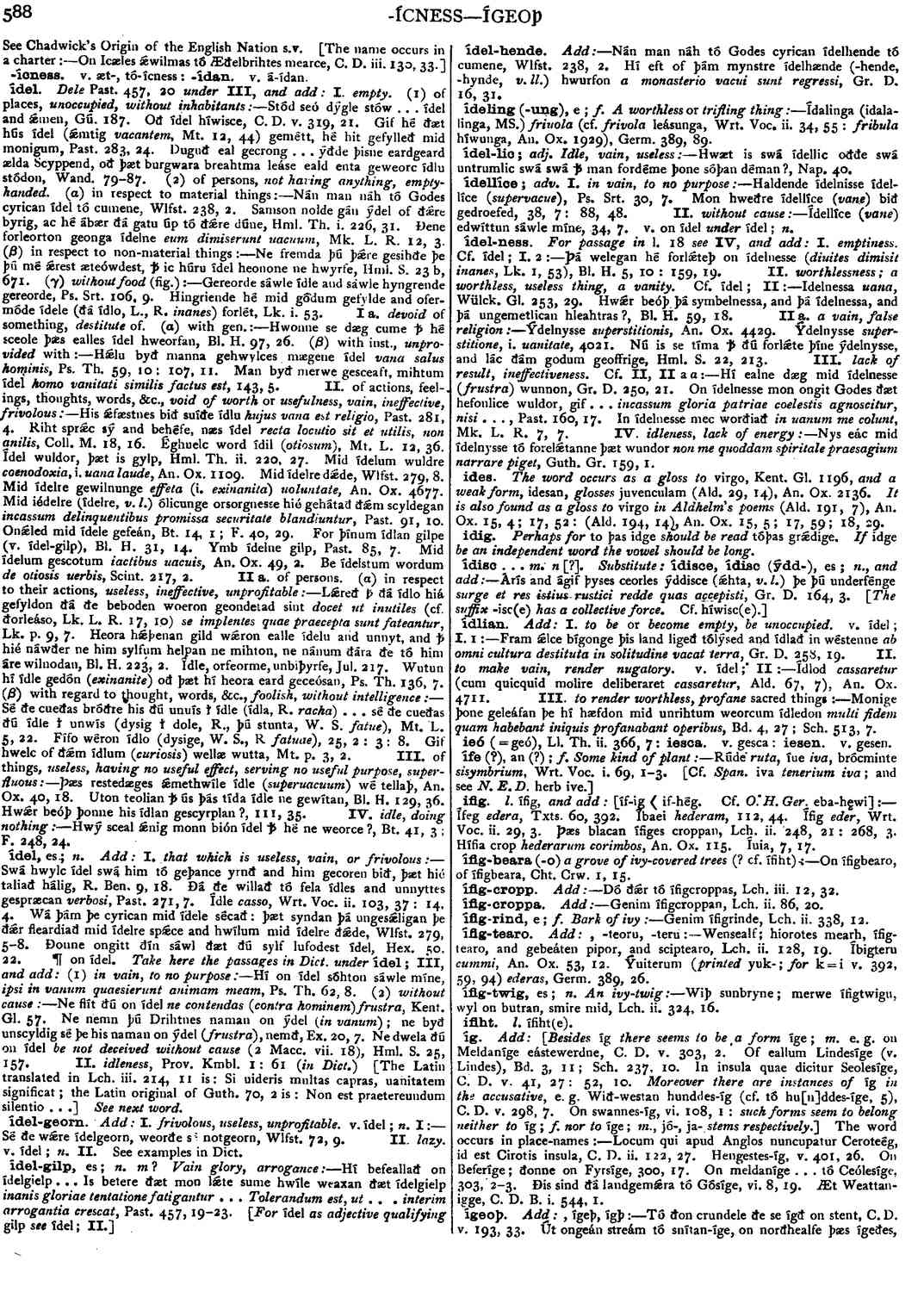ídel
-
Stód seó dýgle stów . . . ídel and ǽmen,
- Gú. 187.
-
Oð ídel híwisce,
- C. D. v. 319, 21.
-
Gif hé ðæt hús ídel (ǽmtig
vacantem.
- Mt. 12, 44)
-
Duguð eal gecrong . . . ýðde þisne eardgeard ælda Scyppend, oð þæt burgwara breahtma leáse eald enta geweorc ídlu stódon,
- Wand. 79-87.
- Nán man náh tó Godes cyrican ídel tó cumene. Wlfst. 238, 2.
-
Samson nolde gán ýdel of ðǽre byrig, ac hé ábær ðá gatu úp tó ðǽre dúne,
- Hml. Th. i. 226, 31.
-
Ðene forleorton geonga ídelne
eum dimiserunt uacuum
,- Mk. L. R. 12, 3.
-
Ne fremda þú þǽre gesihðe þe þú mé ǽrest æteówdest, ꝥ ic húru ídel heonone ne hwyrfe,
- Hml. S. 23 b, 671.
-
Gereorde sáwle ídle and sáwle hyngrende gereorde,
- Ps. Srt. 106, 9.
-
Hingriende hé mid gódum gefylde and ofer-móde ídele (ðá ídlo, L., R.
inanes
) forlét,- Lk. i. 53.
- Ia. devoid of something, destitute of.
-
Hwonne se dæg cume ꝥ hé sceole þæs ealles ídel hweorfan,
- Bl. H. 97, 26.
-
Hǽlu byð manna gehwylces mægene ídel vana solus hominis, Ps. Th. 59, 10: 107, II. Man byð merwe gesceaft, mihtum ídel
homo vanitati similis factus est,
- 143, 5.
-
His ǽfæstnes bið suíðe ídlu
hujus vana est religio,
- Past. 281, 4.
-
Riht sprǽc sý and behéfe, næs ídel
recta locutio sit et utilis, non anilis,
- Coll. M. 18, 16.
-
Éghnelc word ídil (
otiosum
).- Mt. L. 12, 36.
-
Ídel wuldor, þæt is gylp,
- Hml. Th. ii. 220, 27.
-
Mid ídelum wuldre coenodoxia, i.
uana laude
,- An. Ox. 1109.
-
Mid ídelre dǽde,
- Wlfst. 279, 8.
-
Mid ídelre gewilnunge
effeta (i. exinanita) uoluntate,
- An. Ox. 4677.
-
Mid iédelre (ídelre, v. l.) ólicunge orsorgnesse hié gehátað ðǽm scyldegan
incassum delinquentibus promissa securitate blandiuntur,
- Past. 91, 10.
-
Onǽled mid ídele gefeán,
- Bt. 14, l; F. 40, 29.
- For þínum ídlan gilpe (v. ídel-gilp). Bl. H. 31, 14.
-
Ymb ídelne gilp,
- Past. 85, 7.
-
Mid ídelum gescotum
iactibus uacuis
,- An. Ox. 49, 2.
-
Be ídelstum wordum
de otiosis uerbis,
- Scint. 217, 2. II a. of persons,
-
Lǽreð ꝥ ðá ídlo hiá gefyldon ðá ðe beboden woeron geondetad sint
docet ut inutiles (cf. ðorleáso, Lk. L. R. 17, 10) se implentes quae praecepta sunt fateantur,
- Lk. p. 9, 7.
-
Heora hǽþenan gild wǽron ealle ídelu and unnyt, and ꝥ hié náwðer ne him sylfum helpan ne mihton, ne nánum ðára ðe tó him áre wilnodan,
- Bl. H. 223, 2.
-
Ídle, orfeorme, unbiþyrfe,
- Jul. 217.
-
Wutun hí ídle gedón (
exinanite
) oð þæt hí heora eard geceósan,- Ps. Th. 136, 7.
-
Sé ðe cueðas bróðre his ðú unuís ł ídle (ídla, R.
racha) . . . sé ðe cueðas ðú ídle ł unwís (dysig ł dole, R., þú stunta, W. S. fatue ),
- Mt. L. 5. 22.
-
Fífo wéron ídlo (dysige, W. S. , R
fatuae
),- 25, 2 : 3: 8.
-
Gif hwelc of ðǽm ídlum (
curiosis
) wellæ wutta,- Mt. p. 3, 2.
-
Þæs restedæges ǽmethwíle ídle (
superuacuum
) wé tellaþ,- An. Ox. 40, 18.
-
Uton teolian ꝥ ús þás tída ídle ne gewítan,
- Bl. H. 129, 36.
-
Hwǽr beóþ þonne his ídlan gescyrplan?,
- 111, 35.
-
Hwý sceal ǽnig monn bión ídel ꝥ hé ne weorce ?,
- Bt. 41, 3; F. 248, 24.
Bosworth, Joseph. “ídel.” In An Anglo-Saxon Dictionary Online, edited by Thomas Northcote Toller, Christ Sean, and Ondřej Tichy. Prague: Faculty of Arts, Charles University, 2014. https://bosworthtoller.com/53807.
Checked: 0